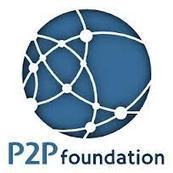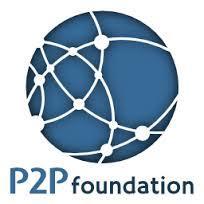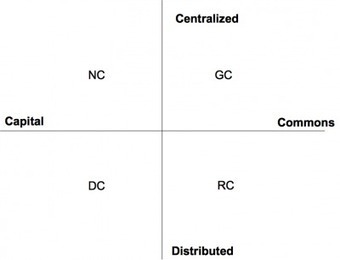 Your new post is loading...
“Both brokering and boundary-spanning roles greatly increase the likelihood of leadership points to the importance of social positions that can unite open innovation communities. We argued that trust does not come easily to community members who fear cooptation by commercial interests or forking over technical disagreements. Because brokers by definition contrive less cohesive and less trusting contexts, the probability that they will assume leadership roles remains highly contingent on building trust with community members. We argue that aspiring leaders can build trust through physical attendance and, consistent with this argument, find a positive interaction with physical attendance. Also consistent with our emphasis on trust in open innovation communities, brokerage and boundary spanning demonstrated a negative interaction, indicating that brokers who span boundaries remain at a disadvantage. While brokerage alone demonstrates positive influence on becoming a leader, boundary spanning demonstrates a much stronger effect. Finally, we did not observe a contingent relationship between boundary spanning and attendance. Our results emphasize the importance of intermediary and integrating roles—for brokers within technological boundaries, and for boundary spanners across cohesive technological boundaries."
"The rise in the usage and delivery capacity of the Internet in the 1990s has led to the development of massively distributed online projects where self-governing volunteers collaboratively produce public goods. Notable examples include Free and Open Source Software (FOSS) projects such as Debian and GNOME, as well as the Wikipedia encyclopedia. These distributed practices have been characterised as peer production, crowdsourcing, mass customization, social production, co-configurative work, playbour, user-generated content, wikinomics, open innovation, participatory culture, produsage, and the wisdom of the crowd, amongst other terms. In peer production, labour is communal and outputs are orientated towards the further expansion of the commons, an ecology of production that aims to defy and resist the hierarchies and rules of ownership that drive productive models within capitalism (Moore, 2011); while the commons, recursively, are the chief resource in this mode of production (Söderberg & O’Neil, 2014).
"Open source and peer production have been praised as organisational models that could change the world for the better. It is commonly asserted that almost any societal activity could benefit from distributed, bottom-up collaboration — by making societal interaction more open, more social, and more democratic. However, we also need to be mindful of the limits of these models. How could they function in environments hostile to openness? Security is a societal domain more prone to secrecy than any other, except perhaps for romantic love. In light of the destructive capacity of contemporary cyber attacks, how has the Internet survived without a comprehensive security infrastructure? Secrecy vs. openness describes the realities of Internet security production through the lenses of open source and peer production theories. The study offers a glimpse into the fascinating communities of technical experts, who played a pivotal role when the chips were down for the Internet after large-scale attacks. After an initial flirtation with openness in the early years, operational Internet security communities have put in place institutional mechanisms that have resulted in less open forms of social production."
"Tiziana Terranova is well known for her thesis, formulated in the early 2000s, that the free labor of users is the source of economic value in the digital economy. Free labor is an ambivalent concept, rooted in Italian post-workerist labor theories of value, such as Paolo Virno's re-reading of Marx's notion of the general intellect, Antonio Negri's theory of the social factory, and Maurizio Lazzarato's concept of immaterial labor. It defines both the outcome of the 'refusal of work' of the 1960s and 1970s and the resulting investment of subjective needs and desires for expression into production (culture, technology, the arts); and its subsequent transformation into the engine of economic production in the post-Fordist economy first and the digital economy later (branding, marketing, social media). Free labor is both free as in 'free beer' (for digital entrepreneurs) and free as in free speech (for those who perform it voluntarily). It is no more of an illusion than industrial labor was, it is simply a new source of value and engine of production which is open to capture by the capitalist enterprise, but maintains a potential to express itself in new forms of economic organizations such as the p2p economy."
* PhD Thesis: ANNA SERAVALLI. MAKING COMMONS (attempts at composing prospects in the opening of production). Doctoral dissertation in Interaction Design. Malmö University, School of Arts and Communication, Faculty: Culture and Society, 2014
"Peer production projects like Wikipedia have inspired voluntary associations, collectives, social movements, and scholars to embrace open online collaboration as a model of democratic organization. However, many peer production projects exhibit entrenched leadership and deep inequalities, suggesting that they may not fulfill democratic ideals. Instead, peer production projects may conform to Robert Michels' "iron law of oligarchy," which proposes that democratic membership organizations become increasingly oligarchic as they grow. Using exhaustive data of internal processes from a sample of 683 wikis, we construct empirical measures of participation and test for increases in oligarchy associated with growth. In contrast to previous studies, we find support for Michels' iron law and conclude that peer production entails oligarchic organizational forms."
* Value and Currency. Ed. by Nathaniel Tkacz, Nicolas Mendoza and Francesca Musiani. Journal of Peer Production, ISSUE 4: JANUARY 2014. (April 2014)
This article deals with the phenomenon of hackerspaces and sheds light on the relationship of their underlying values, organizational structures and productive processes to those of the online communities of Commons-based peer production projects. While hackerspaces adopt hybrid modes of governance, this paper attempts to identify patterns, trends and theory that can frame their production and governance mechanisms. Using a diverse amount of literature and case studies, it is argued that, in many cases, hackerspaces exemplify several aspects of peer production projects’ principles and governance mechanisms.
This essay set out to show, through the case of the RepRap-based, Lego-built 3D printing-milling machine, two points: First, on a theoretical level, that modularity, not only in terms of development process but also of hardware components, can catalyze CBPP’s replication for tangible products enabling social experimentation, learning and innovation. Second, that the synergy of a globally accessible knowledge Commons as well as of the CBPP practices with digital fabrication technologies, which are advancing and becoming more and more accessible, can arguably offer the ability to think globally and produce locally.
A list of P2P Lab collaborators' publications in international peer-reviewed journals, starting from 2013:
|
"There are many threats as we move deeper into the anthropocene age. The dominance based hierarchies that have become an unquestioned part of 21st century life are a reflection of the linear profit driven paradigm that fails to see the interconnectedness between us, and between us and the world we inhabit. In order to find a pathway out of the looming dystopic futures that appear to be unfolding, a new paradigm that recognises the connectedness within nature and the social world is necessary to generate new social structures that can lead to more sustainable, thriving futures.
"Open source and peer production have been praised as organisational models that could change the world for the better. It is commonly asserted that almost any societal activity could benefit from distributed, bottom-up collaboration — by making societal interaction more open, more social, and more democratic. However, we also need to be mindful of the limits of these models. How could they function in environments hostile to openness? Security is a societal domain more prone to secrecy than any other, except perhaps for romantic love. In light of the destructive capacity of contemporary cyber attacks, how has the Internet survived without a comprehensive security infrastructure? Secrecy vs. openness describes the realities of Internet security production through the lenses of open source and peer production theories. The study offers a glimpse into the fascinating communities of technical experts, who played a pivotal role when the chips were down for the Internet after large-scale attacks. After an initial flirtation with openness in the early years, operational Internet security communities have put in place institutional mechanisms that have resulted in less open forms of social production."
"Based on the examples of two collectives preparing lunches and giving them for free with an option of donation at Montreal universities, this article considers how services of general interest could be organized in an alternative way — namely how the combination of paid and unpaid work, spontaneous work involving high number of volunteers, and the dissociation of annual income from sale of output can serve as a model for providing needed public services. The probable expansion of such services in the future is supported by several current trends in the developed countries: for example, underemployment of human resources, a new work ethos, and the democratic deficit inherent in the current system of service provision by state or market providers. This article applies the case study method to illustrate citizens’ attitudes and to consider what structural and organizational changes may be needed to set up an alternative form of service provision potentially applicable to other venues."
* PhD Thesis: ANNA SERAVALLI. MAKING COMMONS (attempts at composing prospects in the opening of production). Doctoral dissertation in Interaction Design. Malmö University, School of Arts and Communication, Faculty: Culture and Society, 2014
"Peer production projects like Wikipedia have inspired voluntary associations, collectives, social movements, and scholars to embrace open online collaboration as a model of democratic organization. However, many peer production projects exhibit entrenched leadership and deep inequalities, suggesting that they may not fulfill democratic ideals. Instead, peer production projects may conform to Robert Michels' "iron law of oligarchy," which proposes that democratic membership organizations become increasingly oligarchic as they grow. Using exhaustive data of internal processes from a sample of 683 wikis, we construct empirical measures of participation and test for increases in oligarchy associated with growth. In contrast to previous studies, we find support for Michels' iron law and conclude that peer production entails oligarchic organizational forms."
"Based on the examples of two collectives preparing lunches and giving them for free with an option of donation at Montreal universities, this article considers how services of general interest could be organized in an alternative way — namely how the combination of paid and unpaid work, spontaneous work involving high number of volunteers, and the dissociation of annual income from sale of output can serve as a model for providing needed public services. The probable expansion of such services in the future is supported by several current trends in the developed countries: for example, underemployment of human resources, a new work ethos, and the democratic deficit inherent in the current system of service provision by state or market providers. This article applies the case study method to illustrate citizens’ attitudes and to consider what structural and organizational changes may be needed to set up an alternative form of service provision potentially applicable to other venues."
"Peer production has often been described as a ‘third mode of production’, irreducible to State or market imperatives. The creation and organisation of peer projects allegedly take place without ‘managerial commands’ or ‘price signals’, without recourse to bureaucratic apparatuses or the logic of competitive markets. Instead, and mimicking the technical architectures upon which many peer projects are based, production is described as non-hierarchical and decentralised. Group dynamics are also commonly described as ‘flat’ and this is captured, of course, in the very notion of the ‘peer’. When tested against the realities of actual projects, however, such early conceptions of peer production are, at best, in need of further elaboration and qualification. At worst, they were always off the mark. Hierarchies persist in peer production, as does competition and market-like arrangements. But perhaps it is the qualities of these new hierarchies and competitive forms that is novel. After all, liberal democracies, dictatorships, corporations, local sports clubs, and families all have their hierarchies but none is reducible to the others.
This essay narrates, from a creator-observation perspective, the production of two works of fiction, a book of short stories and a play, based on the principles and technologies of Commons-based peer production (CBPP). This is potentially interesting from both the CBPP and the literary perspective. Even though both seem well-matched by their prima facie lack of profit orientation, CBPP case studies rarely deal with fiction, and regarding plays, artistic creativity is still mostly associated with one, maybe two. After tracing and analysing the CBPP phenomenon, the case studies show concretely the fate of the specific projects as well as how, nowadays, people can involve in collaborative artistic projects inspired and catalysed by Commons-oriented principles and technologies.
This entry is about the theory of the four future scenarios for a collaborative economy, firstly developed by Michel Bauwens. It is important to mention that Vasilis Kostakis and Michel Bauwens are working on a research monograph that explores the relation of capitalism and the Commons. The book Network Society and Future Scenarios for a Collaborative Economy is contracted by Palgrave Macmillan.
|



 Your new post is loading...
Your new post is loading...












